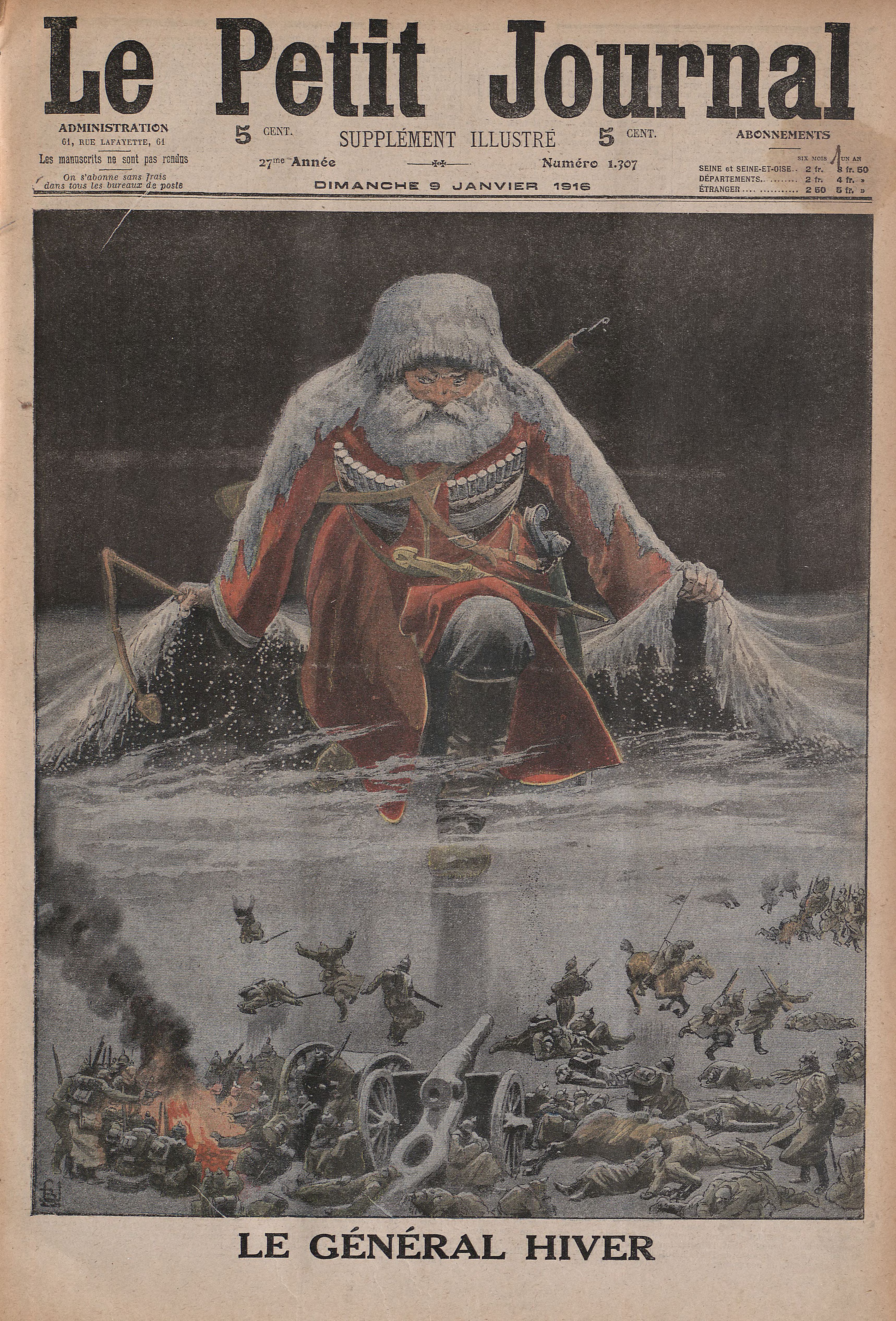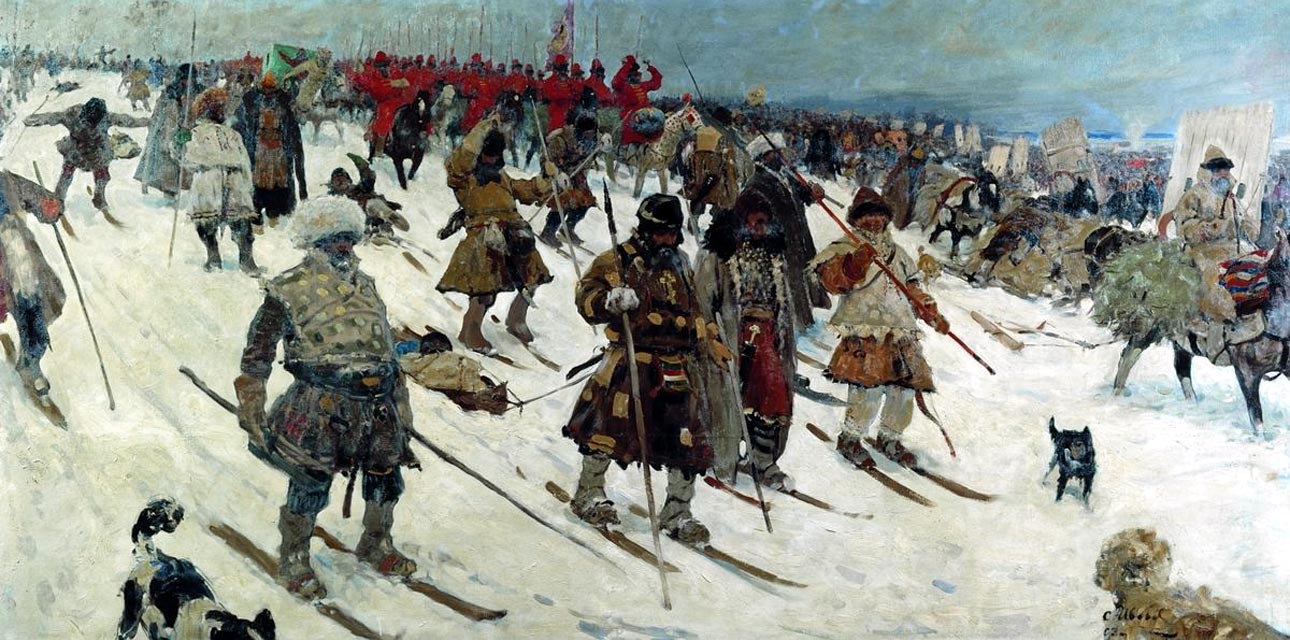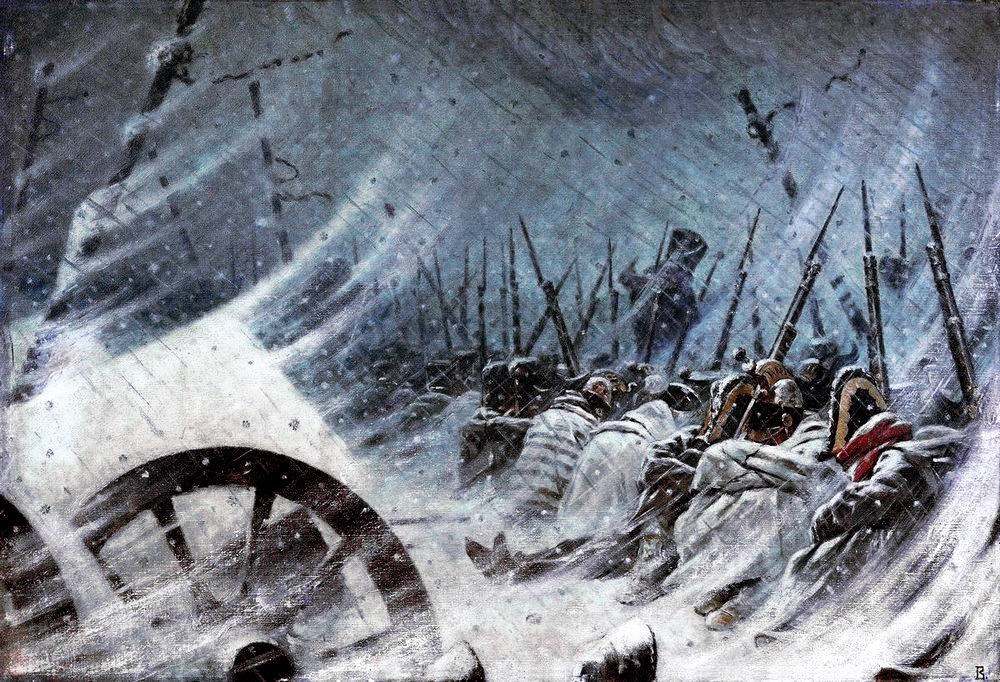Russian winter on:
[Wikipedia]
[Google]
[Amazon]
 Russian Winter, sometimes personified as "General Frost" or "General Winter", is an aspect of the climate of Russia that has contributed to military failures of several invasions of
Russian Winter, sometimes personified as "General Frost" or "General Winter", is an aspect of the climate of Russia that has contributed to military failures of several invasions of
 In his study of
In his study of
 Napoleon's ''Grande Armée'' of 610,000 men invaded Russia, heading towards
Napoleon's ''Grande Armée'' of 610,000 men invaded Russia, heading towards
 Russian Winter, sometimes personified as "General Frost" or "General Winter", is an aspect of the climate of Russia that has contributed to military failures of several invasions of
Russian Winter, sometimes personified as "General Frost" or "General Winter", is an aspect of the climate of Russia that has contributed to military failures of several invasions of Russia
Russia (, , ), or the Russian Federation, is a transcontinental country spanning Eastern Europe and Northern Asia. It is the largest country in the world, with its internationally recognised territory covering , and encompassing one-ei ...
. Mud is a related contributing factor that impairs military maneuvering in Russia and elsewhere, and is sometimes personified as "General Mud". Russians call those muddy conditions ''rasputitsa
''Rasputitsa'' ( rus, распу́тица, p=rɐsˈputʲɪtsə) is a season of the year when travel on unpaved roads or across country becomes difficult, owing to muddy conditions from rain or melting snow.
Etymology
In Russia, the term , р� ...
'', which occur with autumnal rains and spring thaws in Russia and make transport over unimproved roads difficult.
Winter as a contributing factor to military defeat
 In his study of
In his study of winter warfare
Cold-weather warfare, also known as arctic warfare or winter warfare, encompasses military operations affected by snow, ice, thawing conditions or cold, both on land and at sea. Cold-weather conditions occur year-round at high elevation or at ...
in Russia, author Allen F. Chew concludes that "General Winter" was a 'substantial contributing factor'—not a decisive one—in the military failures of both Napoleon
Napoleon Bonaparte ; it, Napoleone Bonaparte, ; co, Napulione Buonaparte. (born Napoleone Buonaparte; 15 August 1769 – 5 May 1821), later known by his regnal name Napoleon I, was a French military commander and political leader wh ...
's and Hitler
Adolf Hitler (; 20 April 188930 April 1945) was an Austrian-born German politician who was dictator of Nazi Germany, Germany from 1933 until Death of Adolf Hitler, his death in 1945. Adolf Hitler's rise to power, He rose to power as the le ...
's invasions of Russia. He notes that Napoleon's army was already suffering significant attrition before winter, owing to lack of supplies, disease, desertions and casualties of war. Likewise, Hitler's ''Wehrmacht
The ''Wehrmacht'' (, ) were the unified armed forces of Nazi Germany from 1935 to 1945. It consisted of the ''Heer'' (army), the '' Kriegsmarine'' (navy) and the ''Luftwaffe'' (air force). The designation "''Wehrmacht''" replaced the previo ...
'' had already suffered 734,000 casualties and was running low on supplies in November 1941, before the arrival of winter.
Examples
Swedish invasion of 1708
In theGreat Northern War
The Great Northern War (1700–1721) was a conflict in which a coalition led by the Tsardom of Russia successfully contested the supremacy of the Swedish Empire in Northern, Central and Eastern Europe. The initial leaders of the anti-Swe ...
, Charles XII of Sweden
Charles XII, sometimes Carl XII ( sv, Karl XII) or Carolus Rex (17 June 1682 – 30 November 1718 O.S.), was King of Sweden (including current Finland) from 1697 to 1718. He belonged to the House of Palatinate-Zweibrücken, a branch line of ...
invaded Russia in 1707. The Russians retreated, adopting a scorched-earth
A scorched-earth policy is a military strategy that aims to destroy anything that might be useful to the enemy. Any assets that could be used by the enemy may be targeted, which usually includes obvious weapons, transport vehicles, communi ...
policy. This winter was the most brutal of the 18th century, so severe that the seaport of Venice
Venice ( ; it, Venezia ; vec, Venesia or ) is a city in northeastern Italy and the capital of the Veneto Regions of Italy, region. It is built on a group of 118 small islands that are separated by canals and linked by over 400 ...
froze during the Great Frost of 1709
The Great Frost, as it was known in England, or ' ("The Great Winter"), as it was known in France, was an extraordinarily cold winter in Europe in 1708–1709,. and was the coldest European winter during the past 500 years.
Notability
William ...
. Charles' 35,000 troops were crippled, and by spring only 19,000 were left. The Battle of Poltava
The Battle of Poltava; russian: Полта́вская би́тва; uk, Полта́вська би́тва (8 July 1709) was the decisive and largest battle of the Great Northern War. A Russian army under the command of Tsar Peter I defeat ...
in late June 1709 sealed the end of the Swedish Empire
The Swedish Empire was a European great power that exercised territorial control over much of the Baltic region during the 17th and early 18th centuries ( sv, Stormaktstiden, "the Era of Great Power"). The beginning of the empire is usually ta ...
.
French invasion of 1812
 Napoleon's ''Grande Armée'' of 610,000 men invaded Russia, heading towards
Napoleon's ''Grande Armée'' of 610,000 men invaded Russia, heading towards Moscow
Moscow ( , US chiefly ; rus, links=no, Москва, r=Moskva, p=mɐskˈva, a=Москва.ogg) is the capital and largest city of Russia. The city stands on the Moskva River in Central Russia, with a population estimated at 13.0 million ...
, in the beginning of summer on 24 June 1812. The Russian army
The Russian Ground Forces (russian: Сухопутные войска �ВSukhoputnyye voyska V}), also known as the Russian Army (, ), are the land forces of the Russian Armed Forces.
The primary responsibilities of the Russian Ground Force ...
retreated before the French and again burnt their crops and villages, denying the enemy their use. Napoleon's army was ultimately reduced to 100,000. His army suffered further, even more disastrous losses on the retreat from Moscow, which started in October. Multiple sources concur that winter and its aftermath was only a contributing factor to Napoleon's defeat and retreat.
To counter claims that the French defeat resulted from winter weather, Denis Davydov
Denis Vasilyevich Davydov ( rus, Дени́с Васи́льевич Давы́дов, p=dʲɪˈnʲis vɐˈsʲilʲjɪvʲɪdʑ dɐˈvɨdəf, a=Dyenis Vasilyevich Davydov.ru.vorb.oga; – ) was a Russian soldier-poet of the Napoleonic Wars who in ...
published a military historical analysis, titled "Was it Frost that Devastated the French Army in 1812?", wherein he demonstrated that the French suffered casualties in battles during relatively mild weather and outlined multiple causes for their defeat. He drew on both his direct observations and on those of foreign commentators, including French authors.
According to Chew in 1981, the main body of Napoleon's ''Grande Armée'', initially at least 378,000 strong, "diminished by half during the first eight weeks of his invasion, before the major battle of the campaign. This decrease was partly due to garrisoning supply centres, but disease, desertions, and casualties sustained in various minor actions caused thousands of losses. At the Battle of Borodino
The Battle of Borodino (). took place near the village of Borodino on during Napoleon's invasion of Russia. The ' won the battle against the Imperial Russian Army but failed to gain a decisive victory and suffered tremendous losses. Napole ...
on 7 September 1812—the only major engagement fought in Russia—Napoleon could muster no more than 135,000 troops and he lost at least 30,000 of them to gain a narrow and pyrrhic victory
A Pyrrhic victory ( ) is a victory that inflicts such a devastating toll on the victor that it is tantamount to defeat. Such a victory negates any true sense of achievement or damages long-term progress.
The phrase originates from a quote from ...
almost 600 miles inside hostile territory. The sequels were his uncontested and self-defeating occupation of Moscow and his humiliating retreat, which began on 19 October, before the first severe frosts later that month and the first snow on 5 November." Lieven cites the difficulty of finding food for troops and forage for horses in winter as an important contributing factor.
Allied intervention in Russia, winter 1918–19
During the Northern Russian Expedition of theAllied intervention in the Russian Civil War
Allied intervention in the Russian Civil War or Allied Powers intervention in the Russian Civil War consisted of a series of multi-national military expeditions which began in 1918. The Allies first had the goal of helping the Czechoslovak Leg ...
, both sides, the Allied forces and the Bolshevik
The Bolsheviks (russian: Большевики́, from большинство́ ''bol'shinstvó'', 'majority'),; derived from ''bol'shinstvó'' (большинство́), "majority", literally meaning "one of the majority". also known in English ...
Red Army
The Workers' and Peasants' Red Army (Russian language, Russian: Рабо́че-крестья́нская Кра́сная армия),) often shortened to the Red Army, was the army and air force of the Russian Soviet Federative Socialist R ...
knew or quickly learned the principles of winter warfare and applied them whenever possible. However both sides had their resources strained and at times one side or other suffered the severe consequences of underpreparedness, but Chew concluded that winter did not provide a decisive advantage to any of the combatants.
German invasion of 1941
DuringWorld War II
World War II or the Second World War, often abbreviated as WWII or WW2, was a world war that lasted from 1939 to 1945. It involved the World War II by country, vast majority of the world's countries—including all of the great power ...
, the Wehrmacht
The ''Wehrmacht'' (, ) were the unified armed forces of Nazi Germany from 1935 to 1945. It consisted of the ''Heer'' (army), the '' Kriegsmarine'' (navy) and the ''Luftwaffe'' (air force). The designation "''Wehrmacht''" replaced the previo ...
lacked necessary supplies, such as winter uniforms, due to the many delays in the German army's movements. At the same time, Hitler's
Adolf Hitler (; 20 April 188930 April 1945) was an Austrian-born German politician who was dictator of Nazi Germany, Germany from 1933 until Death of Adolf Hitler, his death in 1945. Adolf Hitler's rise to power, He rose to power as the le ...
plans for Operation Barbarossa
Operation Barbarossa (german: link=no, Unternehmen Barbarossa; ) was the invasion of the Soviet Union by Nazi Germany and many of its Axis allies, starting on Sunday, 22 June 1941, during the Second World War. The operation, code-named afte ...
actually miscarried before the onset of severe winter weather. Neither Hitler nor the General Staff anticipated a long campaign lasting into the winter. Thus, they failed to make adequate preparations for a possible winter campaign, such as the distribution of warm clothing and winterization
Winterization is the process of preparing something for winter.
Humanitarian aid
In emergency or disaster response situations, such as managed by the UNHCR, winterization activities include the distribution of items including blankets, quilts ...
of vehicles and lubricants. In fact his eastern army suffered more than 734,000 casualties (about 23% of its average strength of 3,200,000) during the first five months of the invasion before the winter started. On 27 November 1941, Eduard Wagner
Eduard Wagner (1 April 1894 – 23 July 1944) was a general in the Army of Nazi Germany who served as quartermaster-general in World War II. He had the overall responsibility for security in the Army Group Rear Areas, and thus bore responsibil ...
, the Quartermaster General of the German Army, reported that "We are at the end of our resources in both personnel and material. We are about to be confronted with the dangers of deep winter." Also of note is the fact that the unusually early winter of 1941 cut short the ''rasputitsa
''Rasputitsa'' ( rus, распу́тица, p=rɐsˈputʲɪtsə) is a season of the year when travel on unpaved roads or across country becomes difficult, owing to muddy conditions from rain or melting snow.
Etymology
In Russia, the term , р� ...
'' season, improving logistics in early November, with the weather still being only mildly cold.
Winter effects on warfare
In his 1981 paper, ''Fighting the Russians in Winter: Three Case Studies'', Chew draws on experiences from the Allied-Soviet War in Northern Russia during the Winter of 1918–19, the destruction of the Soviet 44th Motorized Rifle Division, and German–Soviet War duringWorld War II
World War II or the Second World War, often abbreviated as WWII or WW2, was a world war that lasted from 1939 to 1945. It involved the World War II by country, vast majority of the world's countries—including all of the great power ...
to derive winter warfare factors pertaining to military tactics
Military tactics encompasses the art of organizing and employing fighting forces on or near the battlefield. They involve the application of four battlefield functions which are closely related – kinetic or firepower, Mobility (military), mobil ...
, materiel
Materiel (; ) refers to supplies, equipment, and weapons in military supply-chain management, and typically supplies and equipment in a commercial supply chain context.
In a military context, the term ''materiel'' refers either to the spec ...
and personnel
Employment is a relationship between two party (law), parties Regulation, regulating the provision of paid Labour (human activity), labour services. Usually based on a employment contract, contract, one party, the employer, which might be a co ...
:
* ''Tactics'' – Defensive positions are highly advantageous because of the ability to maintain warmth and protection, compared to attacking in winter cold. Mobility and logistical support are often restricted by snow, requiring plowing or compacting it to accommodate wide-tracked vehicles or sleds. Infantry
Infantry is a military specialization which engages in ground combat on foot. Infantry generally consists of light infantry, mountain infantry, motorized infantry & mechanized infantry, airborne infantry, air assault infantry, and mar ...
movement in deep snow requires skis or snowshoes to avoid exhaustion. Sound carries well over crusted snow, diminishing the element of surprise. Explosives are useful for excavating foxholes and larger shelters in frozen ground. Attacking field kitchens and encampments deprives the enemy of food and shelter. Rapid removal of the wounded from the battlefield is essential to their survival in the cold.
* ''Materiel'' – Weapons and vehicles require special lubricants to operate at low temperatures. Mines are unreliable in winter, owing to deep snow that may cushion the fuse or form an ice bridge over the detonator.
* ''Personnel'' – Proper winter clothing is required to maintain body heat and to avoid such cold injuries as frostbite. Troop efficiency and survival requires either making use of available shelter or providing portable shelter.
Sandy Woodward
Admiral Sir John Forster "Sandy" Woodward, (1 May 1932 – 4 August 2013) was a senior Royal Navy officer who commanded the Task Force of the Falklands War.
Early life
Woodward was born on 1 May 1932 at Penzance, Cornwall, to a bank clerk. He ...
, Royal Navy
The Royal Navy (RN) is the United Kingdom's naval warfare force. Although warships were used by English and Scottish kings from the early medieval period, the first major maritime engagements were fought in the Hundred Years' War against Fr ...
task force commander during the Falklands War
The Falklands War ( es, link=no, Guerra de las Malvinas) was a ten-week undeclared war between Argentina and the United Kingdom in 1982 over two British dependent territories in the South Atlantic: the Falkland Islands and its territorial ...
, which was fought before the oncoming South Atlantic winter, remarked in his memoirs, "I thought then, for the first time, about the arrival of General Winter. If he had been here ten days ago, he would not have been much help to the Args Argentines
Argentines (mistakenly translated Argentineans in the past; in Spanish (masculine) or (feminine)) are people identified with the country of Argentina. This connection may be residential, legal, historical or cultural. For most Argentines, ...
], dug in on the heights with no chance of their High Command getting their air forces into the skies. But I think he would’ve finished us."
See also
* History of Russia *Winter War
The Winter War,, sv, Vinterkriget, rus, Зи́мняя война́, r=Zimnyaya voyna. The names Soviet–Finnish War 1939–1940 (russian: link=no, Сове́тско-финская война́ 1939–1940) and Soviet–Finland War 1 ...
References
External links
{{Commons category, Winter in Russia National personifications Military history of Russia Winter in culture Climate of Russia Winter in the Soviet Union Fictional generals